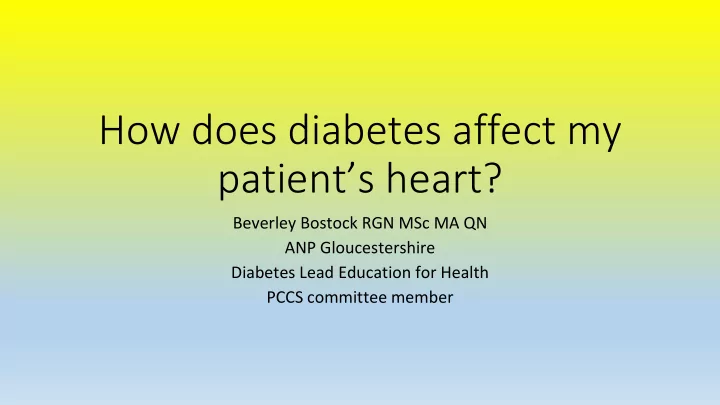

How does diabetes affect my patient’s heart? Beverley Bostock RGN MSc MA QN ANP Gloucestershire Diabetes Lead Education for Health PCCS committee member
Primary Care Cardiovascular Society website
How to re register fo for r Membership Annual Subscription GPs £40 Pharmacists, GP Registrars and Nurses £20 How to Register To register for membership please follow this link http://pccs.lcwmed.co.uk Or call 01444 414264 Or email registrations@LCWmed.co.uk
Aims By the end of this session you will be able to • i) evaluate the impact of diabetes and heart health • ii) recognise lifestyle interventions which can improve cardiovascular outcomes and • iii) consider the impact that drug therapies can have on heart health, beyond glycaemic control.
The real of the cost of diabetes ‡ †
Excess mortality in Type 2 Diabetes is largely related to Cardiovascular Disease 1 CV disease is responsible for approximately half of all deaths in people Around one third of people with with T2D 2 , with many of T2D also have CV disease 2 these deaths premature 3 CV disease can occur 10−15 years earlier Diabetes accelerates the time to in patients with diabetes compared with the first CV event 6 * those without diabetes 4,5 *Time to first myocardial infarction event or first heart failure hospitalisation. CV = cardiovascular; T2D = type 2 diabetes. 1. Tancredi M, et al . N Engl J Med 2015;373:1720 – 1732; 2. Einarson TR, et al . Cardiovasc Diabetol 2018;17:83; 3. Fisher M, Shaw KM. Pract Diab Int 2001;18:183 – 184; 4. Malmberg K, et al. Circulation 2000;102:1014 – 1019; 5. Booth GL, et al. Lancet 2006;368:29 – 36; 6. McMurray JJV, et al. Lancet Diabetes Endocrinol 2014;2:843 – 851.
What happens?
Why?
UKPDS: HbA1c lowering and complication risk 11mmol/mol decrease in HbA 1c 43% 37% 21% 14% 12% Stroke † Amputation or fatal Microvascular Deaths related to Heart attack* peripheral blood vessel complications diabetes* e.g. kidney disease disease* and blindness* *P<0.0001; †P=0.035. UKPDS=UK Prospective Diabetes Study. Stratton IM et al (2000) BMJ 321: 405 – 12
Lifestyle – underpins all
Clinical practice in the UK: NICE Guideline 28 does not currently include Cardiovascular Outcome Trial Data Dec 2015 May 2017 2020 NG28 NG28 NG28: review due published updated (new guidance TBC) BMI = body mass index; DPP-4i = dipeptidyl peptidase-4 inhibitor; GLP-1 = glucagon-like peptide-1; SGLT2i = sodium-glucose co-transporter-2 inhibitor; SU = sulphonylurea. National Institute for Health and Care Excellence (December 2015, last updated April 2017) Algorithm for blood glucose lowering therapy in adults with type 2 diabetes. Available from: http://www.nice.org.uk/guidance/ng28/resources/algorithm-for-blood-glucose-lowering-therapy-in-adults-with-type-2-diabetes-2185604173 (accessed January 2019). NICE guidance is prepared for the National Health Service in England and is subject to regular review and may be updated or withdrawn. NICE has not checked the use of its content in this module to confirm that it accurately reflects the NICE publication from which it is taken.
The 2018 EASD/ADA consensus report has incorporated Cardiovascular Outcome Trial Data The EASD/ADA report is a consensus statement and should not be used as guidance. ADA = American Diabetes Association; CVOT = cardiovascular outcome trial; EASD = European Association for the Study of Diabetes. Davies MJ, et al. Diabetologia 2018;61:2461 – 2498.
What about this?
Diabetes and heart failure • Cardiac Failure Review 2015;1(1):8 – 10
Newer glycaemic agents – the great HOPE? • SGLT2 inhibitors: • Lower plasma glucose & HbA1c • Induce moderate natriuresis • Reduce blood pressure • Reduce weight • Exert cardio-protective properties on the heart • GLP1- RAs & CVD
Medication • Triple whammy: • Glycaemic control • BP • Lipids
In summary • Diabetes impacts on vascular and heart health • Cost is financial and in terms of quality of life/years of life lost • Both lifestyle interventions and drug therapies can improve heart health, beyond glycaemic control, in those with established disease and those who are at increased risk • b.bostock@educationforhealth.org
Conclusion • The management of CVD in diabetes remains a major priority • We need to individualise treatment choices in CVD & with diabetes • Individuals with diabetes and CVD may benefit most from SGLT2 inhibitors or certain GLP1 receptor agonists • Individuals with diabetes and HF and/or CKD may benefit most from SGLT2 inhibitors • Emerging evidence of SGLT2i beneficial in patients with heart failure without diabetes • Guidelines are changing – most recently SIGN 2017 & ADA/EASD October 2018 • Watch this space! • DAPA-CKD, EMPA-KIDNEY, EMPEROR-Reduced, EMPEROR-Preserved, PRESERVED-HF
Recommend
More recommend